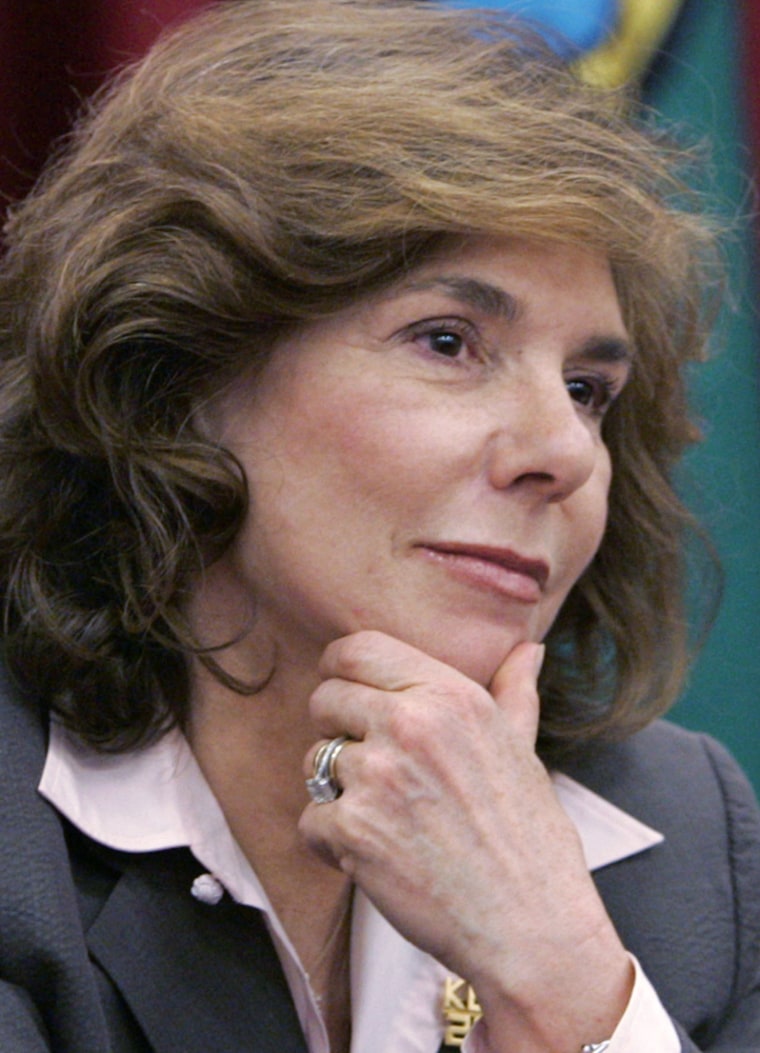On the national stage for nearly a year, Teresa Heinz Kerry has refused to play by the usual script.
“I’m not going to be anyone’s puppet,” Heinz Kerry, 65, said in an interview with The Associated Press. “If I was scripted, I couldn’t do it.”
There have been few plastic smiles, no fawning gazes at her husband, Democratic presidential candidate John Kerry. When he grips her too tightly, she winces. If she doesn’t think a joke is funny, she doesn’t laugh. If someone asks a potentially embarrassing question — about Botox or their prenuptial agreement — she answers, regardless of the headlines she might create.
“If you’re a staffer on the Kerry campaign, you listen to her and you gotta wonder every time she gets up what she’s going to say,” said Terry Madonna, a public policy professor at Franklin & Marshall College in Lancaster, Pa. “To many people, her candor is refreshing but also unpredictable.”
Little about Heinz Kerry’s life story has been predictable, from her birth to Portuguese parents in an East African dictatorship to her emergence as one of the richest women in America following the death of her first husband, Republican Sen. John Heinz III of Pennsylvania, in 1991.
“I’m a human being like everybody else,” Heinz Kerry said. “I feel pain. I’ve had my ups and downs like everybody. I’ve had my sadnesses.”
John Heinz, heir to the ketchup fortune, introduced his wife to Kerry during a 1990 Earth Day press conference in Washington. Two years later, after Heinz’s death in a helicopter crash, Kerry was seated next to Teresa Heinz at the Rio de Janeiro Earth Summit.
Married in 1995
In 1995, they exchanged vows as his two daughters from a previous marriage and her three sons looked on. Yet it wasn’t until the elections of 2002, when the GOP questioned the patriotism of Sen. Max Cleland of Georgia, who lost three limbs in Vietnam, that she joined her husband’s political party.
“When have we had a candidate’s wife who had been in the opposite party? Who has all that money? And who has that rather exotic background?” asked Myra Gutin, a historian of first ladies from Rider University. “She is never going to be the typical candidate’s wife.”
That, according to her friends and old warriors from the Heinz Senate campaigns, is her strength — and a resource the Kerry campaign should be eager to tap. They describe her as a fiercely intelligent, thoughtful, compassionate person who has an unswerving loyalty to her own sense of self, even when it would be politically expedient to act like someone else.
“Voters out there think that politicians are all alike, that they don’t tell the truth, that they don’t say what they think. Teresa is a breath of fresh air and that’s what this country needs,” said Wren Wirth, one of Heinz Kerry’s closest friends and the wife of former Sen. Tim Wirth of Colorado.
'They see me as a dollar sign'
While many define Heinz Kerry by her enormous wealth — “They see me as a dollar sign,” she says — her roots are more modest. She grew up in Mozambique, the daughter of an oncologist of comfortable means.
She studied at a South African university, honing her fluency in five languages — Italian, French and Spanish besides English and her native Portuguese — which she sometimes whips out on the campaign trail. She met her first husband while studying at an interpreters school in Switzerland.
Heinz Kerry is said to be worth $500 million or more, and she owns five homes. Still, friends and campaign observers say, she has an ability to connect to voters whose lives are quite different from hers.
“She really talked to me as a person,” a Kerry supporter, Barbara Adams, 69, of Darien, Conn., said after a recent luncheon fund-raiser in Boston. “What she said seemed to come right from the soul.”
After Heinz’s death, she was pressured to run for his seat. Instead, she decided to become the chairwoman of The Howard Heinz Endowment and the Heinz Family Philanthropies, helping to steer investments to the arts, the environment, education, children and health care.
Uncomfortable in the spotlight
On the campaign trail, Heinz Kerry does not always appear comfortable in the spotlight. Friends say she never has.
“I think she likes the politics that is the arena of ideas,” said Larry McCarthy, a GOP media consultant and longtime press secretary to John Heinz, “but I think she could very happily dispense with the campaign element of that.”
Republicans speculate that Heinz Kerry’s candid moments, when she talks openly about her personal and political beliefs, could clash with her husband’s more measured approach.
“The biggest danger for Kerry is that his stances on issues are so carefully calibrated that she might speak the truth and mess up the very carefully scripted way Kerry is hoping voters perceive the issue,” said Massachusetts Republican consultant Rob Gray. “The more outspoken she is, the more she could end up contradicting him.”
Heinz Kerry’s youngest son argues, however, that his mother’s candor complements his stepfather’s style.
“I think some people think John is too scripted,” said Chris Heinz, 31, “so in that way, they balance each other.”
For a strong woman, Heinz Kerry is soft-spoken, her accented voice strained by stump speeches and the one-on-one conversations she says she so enjoys in the small towns of America. At a recent women’s luncheon, she spoke of the need to revive America’s “can-do” attitude, of the 20 pounds she’s gained on the trail, of the “young man” she married nine years ago.
“I had initial doubts about my ability to be a good partner in this campaign. Whether or not I would hurt, whether or not I would help,” she said. “I didn’t think I could stay focused, disciplined, strong enough. But I did it.”
